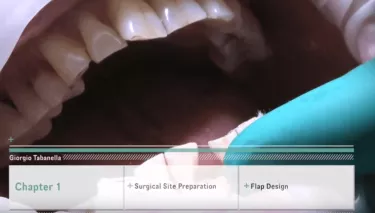
Retreating complications and failures in dental medicine : Dr Giorgio Tabanella
Dr. Tabanella is the author of a recent compendium titled “Decision Making for Retreatment of Failures in Dental Medicine”. It details a range of clinical cases that all have a common element and how these cases have been retreated.

Dr. Giorgio Tabanella is a Rome-based periodontist and implantologist who has lectured internationally and been published in a range of peer-reviewed journals. He is also the author of a recent compendium, comprised of four DVDs in three languages with detailed English booklets, titled Decision Making for Retreatment of Failures in Dental Medicine. This compendium details a range of clinical cases that all have a common element – an error, failure, or complication – and how these cases have been retreated. Here, he discusses the content of these DVDs and booklets and highlights what inspired him to create them.
Nobel Biocare: Dr. Tabanella, could you provide us with a brief overview of this compendium.
Dr. Giorgio Tabanella: “Each volume is sort of a surgical atlas that contains clinical cases that have involved failures, complications, and damage inflicted through errors. With the DVDs, the viewer is taken through the retreatment of each case step-by-step, with high definition video allowing dentists to see every single step of the protocol that was performed, the techniques, instruments and materials that were used, and any other variables that come into play.”
Are there any particularly common forms of mistreatment that you came across in making this?
Dr. Tabanella: “The most common type of mistreatment is related to the insertion of dental implants in patients with untreated periodontal disease. Periodontal training is a must for understanding how to assess the risk of treating periodontal patients. Once the periodontitis has been eradicated, the risk of an ailing dental implant, peri-implantitis or bone loss is close to zero”.
Who would you consider to be the target audience of this?
Dr. Tabanella: “It is not only periodontists who can benefit from these volumes. It is a compendium for every professional, general practitioners and specialists. A failure or complication can happen to anyone – what’s important is being able to solve it. Working on this resource has been such an excellent learning experience for me, and I hope that this compendium may be of help for many doctors as well as patients”.
What was it that inspired you to create this – an absence of training or access to education, perhaps, for dental specialists?
Dr. Tabanella: “Yes, that’s definitely part of it – there is a real lack of training for doctors on how to solve failures. However, I simply wanted to help people smile again: this also motivated me. During my training I was told not to treat complications and failures of other colleagues. However, when I face patients crying because of their problems I find very difficult, as a doctor, not to treat them. Through this resource, I would like to inspire professionals to help more patients in critical situations.
Are there any particular Nobel Biocare concepts or products that are included in this compendium?
Dr. Tabanella: “Nobel Biocare products like NobelActive and the creos xenoprotect are used in the retreatment of many of these cases. Given that the company has such a large portfolio of products, it provides solutions for many of the retreatments. Treatment planning is very important, but what’s also crucial is that dentists use products of excellent quality as well as being properly trained.”
